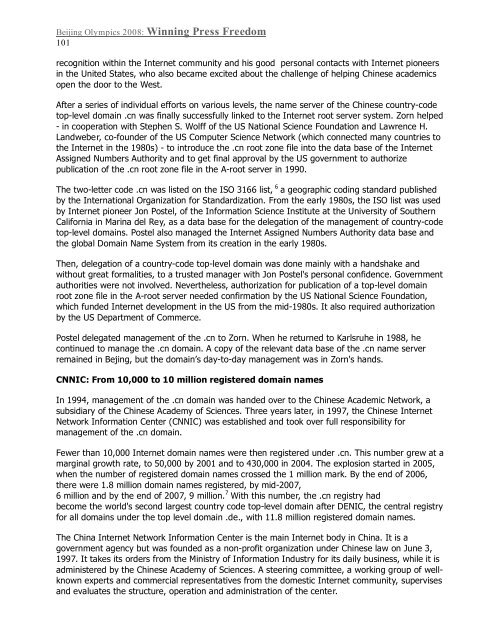Beijing Olympics 2008: Winning Press Freedom - World Press ...
Beijing Olympics 2008: Winning Press Freedom - World Press ...
Beijing Olympics 2008: Winning Press Freedom - World Press ...
You also want an ePaper? Increase the reach of your titles
YUMPU automatically turns print PDFs into web optimized ePapers that Google loves.
<strong>Beijing</strong> <strong>Olympics</strong> <strong>2008</strong>: <strong>Winning</strong> <strong>Press</strong> <strong>Freedom</strong><br />
101<br />
recognition within the Internet community and his good personal contacts with Internet pioneers<br />
in the United States, who also became excited about the challenge of helping Chinese academics<br />
open the door to the West.<br />
After a series of individual efforts on various levels, the name server of the Chinese country-code<br />
top-level domain .cn was finally successfully linked to the Internet root server system. Zorn helped<br />
- in cooperation with Stephen S. Wolff of the US National Science Foundation and Lawrence H.<br />
Landweber, co-founder of the US Computer Science Network (which connected many countries to<br />
the Internet in the 1980s) - to introduce the .cn root zone file into the data base of the Internet<br />
Assigned Numbers Authority and to get final approval by the US government to authorize<br />
publication of the .cn root zone file in the A-root server in 1990.<br />
The two-letter code .cn was listed on the ISO 3166 list, 6 a geographic coding standard published<br />
by the International Organization for Standardization. From the early 1980s, the ISO list was used<br />
by Internet pioneer Jon Postel, of the Information Science Institute at the University of Southern<br />
California in Marina del Rey, as a data base for the delegation of the management of country-code<br />
top-level domains. Postel also managed the Internet Assigned Numbers Authority data base and<br />
the global Domain Name System from its creation in the early 1980s.<br />
Then, delegation of a country-code top-level domain was done mainly with a handshake and<br />
without great formalities, to a trusted manager with Jon Postel's personal confidence. Government<br />
authorities were not involved. Nevertheless, authorization for publication of a top-level domain<br />
root zone file in the A-root server needed confirmation by the US National Science Foundation,<br />
which funded Internet development in the US from the mid-1980s. It also required authorization<br />
by the US Department of Commerce.<br />
Postel delegated management of the .cn to Zorn. When he returned to Karlsruhe in 1988, he<br />
continued to manage the .cn domain. A copy of the relevant data base of the .cn name server<br />
remained in Bejing, but the domain’s day-to-day management was in Zorn's hands.<br />
CNNIC: From 10,000 to 10 million registered domain names<br />
In 1994, management of the .cn domain was handed over to the Chinese Academic Network, a<br />
subsidiary of the Chinese Academy of Sciences. Three years later, in 1997, the Chinese Internet<br />
Network Information Center (CNNIC) was established and took over full responsibility for<br />
management of the .cn domain.<br />
Fewer than 10,000 Internet domain names were then registered under .cn. This number grew at a<br />
marginal growth rate, to 50,000 by 2001 and to 430,000 in 2004. The explosion started in 2005,<br />
when the number of registered domain names crossed the 1 million mark. By the end of 2006,<br />
there were 1.8 million domain names registered, by mid-2007,<br />
6 million and by the end of 2007, 9 million. 7 With this number, the .cn registry had<br />
become the world's second largest country code top-level domain after DENIC, the central registry<br />
for all domains under the top level domain .de., with 11.8 million registered domain names.<br />
The China Internet Network Information Center is the main Internet body in China. It is a<br />
government agency but was founded as a non-profit organization under Chinese law on June 3,<br />
1997. It takes its orders from the Ministry of Information Industry for its daily business, while it is<br />
administered by the Chinese Academy of Sciences. A steering committee, a working group of wellknown<br />
experts and commercial representatives from the domestic Internet community, supervises<br />
and evaluates the structure, operation and administration of the center.





